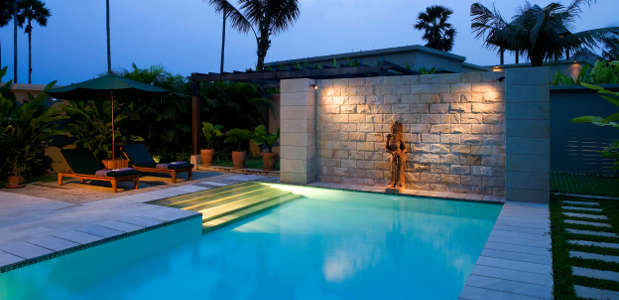
If you long to take a dip at your convenience, and you have room to install one, building a swimming pool can provide hours of relaxation and fun. But before you begin, you need to assess your wants and needs.
Indoor swimming pools will either require construction of an addition to your home or an outbuilding. If you have an enclosed pool building in mind, make sure it has adequate water and utility services.
Pool Options
Swimming pools come in two basic types: above-ground and in-ground. Investigate materials and finishes that best suit your tastes. Swimming pools come in a variety of different materials, some requiring more maintenance than others.
Fiberglass is used for a one-piece tub fitted into a pre-dug hole. The slick surface of fiberglass repels algae, but it will need occasional re-coating.
Concrete is covered with a plaster water seal that can take more wear and tear than other materials. Concrete pools need to be replaced or resurfaced every 7 to 10 years.
Aggregate finish is a concrete pool with a specialized finish that has better traction. It’s covered with a layer of embedded rounded gravel.
Tile is a concrete pool with a tile finish instead of a plaster finish. The tile surface requires less surface maintenance than other surfaces.
Vinyl-lined pools have a slick surface that, like fiberglass, repels algae. It’s easier to maintain the chemical balance in vinyl pools, but they need to be replaced about every 10 years.
Also, consider which size or shape will best suit your needs. If you want to swim laps, you’ll need a long pool. If you want to entertain, you’ll need some non-pool space (such as a deck) and shade. If you want a pool to just relax, a smaller model may be adequate.
Pool Maintenance
Plan to spend about four to eight hours a week on routine maintenance. Basic maintenance equipment includes a vacuum cleaner, brushes, leaf skimmer and water test kit. You will also need to add sanitizing chemicals.
Murky or colored water may mean you have chemical imbalances, pollutants such as microorganisms, or a clogged filter. Clogged filters can mean money down the drain.
Algae can be another spoiler. It needs to be attacked two ways. First, through chemical treatment and second, through a lot of filtering, backwashing, scrubbing, and skimming. Whether it is green, brown, or little black spots, algae will take over your pool if it is not dealt with immediately.
If you prefer, you can also hire a professional pool maintenance company.
Ready to start your Swimming Pool?
Find ProsIf you own an outdoor pool in a climate that gets cold during the winter, many experts strongly suggest you winterize it. Winterization usually entails draining most of the water, blowing out the pipes, applying algaecide and antifreeze in key areas, and covering the pool. Winterization will protect your pool from any freeze damage that can harm the surface and equipment.
Features
Pools can come with several different features. Some of which can be upgraded or remodeled later to save initial costs.
Many larger pools have heaters, especially those installed in cooler climates. Many homeowners turn off the heater in the warmer months to save on the utility bill.
Your filtration system keeps the water clean. Improper chemical balances open the door to contamination, therefore it’s also advisable to use a water testing kit. It gives a good indication of when you need temporary treatment, and when a pool service professional is needed.
Some manual pool covers are designed for safety to keep kids out of the water in case they slipped on the edge. Winter covers can also lower your heating and chemical use. It’s a nice feature to keep leafs and bugs at a minimum.
An automatic pool cover is just like a manual cover, except a machine rolls it back and forth along tracks.
A professional can help you make the choices that best suit you, as well as explain the different trades that may be involved in the type of pool you choose from general construction and excavating and grading to concrete and plumbing work. And, remember, though it’s tempting to try installing a pool at the beginning of peak swimming season, you can save money if you purchase it at the end of the season.
Standard pools take about three to six weeks to build, so plan accordingly.
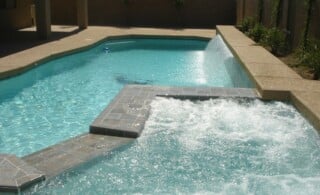 Swimming Pool Glossary
Swimming Pool Glossary 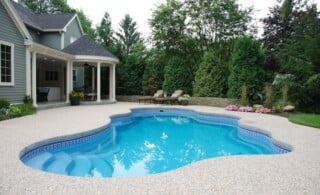 Pros, Cons & Costs: Fiberglass Pools
Pros, Cons & Costs: Fiberglass Pools 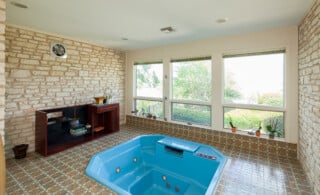 Indoor Hot Tub: A Steamy Situation
Indoor Hot Tub: A Steamy Situation 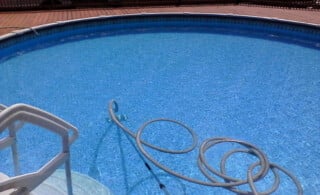 Why Everybody Should Have a Pool Cleaner
Why Everybody Should Have a Pool Cleaner 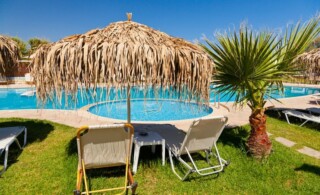 Quick Tips for a Summer-Ready Pool
Quick Tips for a Summer-Ready Pool 

About five years ago, I had my in-ground pool redone along with a new skimmer. Now the pool decking is cracked near the skimmer and I suspect that there may be a leak somewhere under the decking or near by. Would appreciate an evaluation of repair.